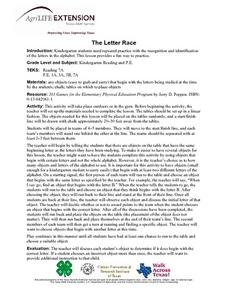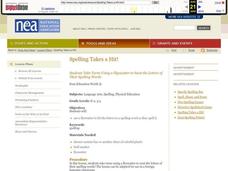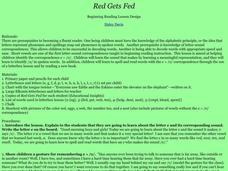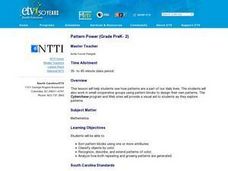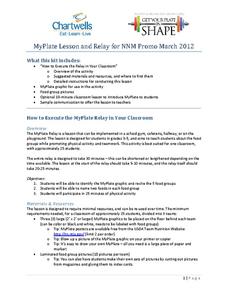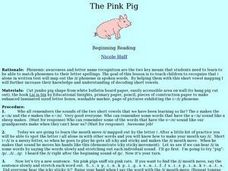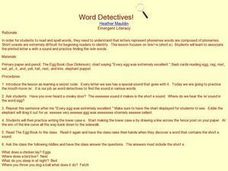Curated OER
The Letter Race
Students practice identifying the letters in the alphabet. They use this activity in phyical education class and run to each letter when they identify it correctly. They also state the name of different objects throughout the room.
Curated OER
Spelling Takes a Hit!
Students practice spelling and word recognition. In this spelling lesson plan, students play a game. . Students are given a word to spell and as they call out each letter, they swat the letter with a fly swatter allowing each student to...
Curated OER
Red Gets Fed
Students practice with the strategy that letters represent phonemes and spellings map out phonemes in spoken words. They work on the phoneme sounds of /a/ and e=/e/ in correspondences with reading. Each student also recites the tongue...
Curated OER
Making Words
In this word building worksheet, students cut out the given letters and create words. Students record the words into the columns.
Curated OER
Word Families: ake
Young learners create a book of words that use the letter combination ake. Six pages are included for them to cut and color, and there's a space for them to trace the letters of the word as well as write the word independently. The...
Curated OER
Pattern Power
Young elementary students will discover there are patterns all around them in their daily lives. In groups, they sort pattern blocks by size and color. Using the internet, they create their own type of patterns and share them with the...
Curated OER
How Many Words Can You Make?
In this letters and words recognition worksheet, students use the letters sh, ck, p, d, and the vowels a, e, e, i, and o to create words. Students write 14 word answers.
Cartwells
MyPlate Lesson and Relay
Youngsters are up and moving in an exciting relay race designed to help them better understand where common foods fall on the MyPlate nutritional guidelines. Working in teams, they identify images of foods and name what food groups they...
Curated OER
What Did You Say?
Students recognize the short vowel E in written and spoken language. Through matching activities, they discriminate the short vowel /e/ from other phonemes. Students associate the phoneme with its letter representation and read pseudo...
Curated OER
Eddie the Egg
First graders recognize the short vowel e in written and spoken language. Through matching activities, they discriminate the short vowel /e/ from other phonemes. Students associate the phoneme with its letter representation and identify...
Curated OER
Colors Quiz
Instead of using this resource as a quiz, consider dividing each of the six activities into small, daily bell-ringers. Some of the activities recall vocabulary words; the first exercise has learners unscramble Spanish colors to complete...
Curated OER
The Pink Pig
Students identify the short /i/ sound in spoken words and the letter symbol in this lesson plan. They say a tongue twister emphasizing words with the short /i/ sound. They then read the story "Liz is Six" and identify the words with...
Curated OER
"Ehhh" I can't hear you!
Students practice writing, sounding out, and identifying words using the short "e" sound. They listen as the teacher reads a tongue twister emphasizing short "e" beginning sounds. The stuents then participate in an activity in which...
Curated OER
Can You Open the Creaky Door?
Students recognize the short vowel e in written and spoken language. Through matching and listening activities, they discriminate the vowel sound /e/ from other phonemes. Students identify the phoneme and letter in words and pictures.
Curated OER
Word Detectives!
Students recognize the short vowel e in written and spoken language. Through matching activities, students discriminate the short vowel e from the long vowel o. They associate the phoneme with its letter representation and identify the...
Curated OER
Eerie Exits
Students recognize the short vowel e in written and spoken language. Through matching and listening activities, they discriminate the short vowel /e/ from other phonemes. Students associate the phoneme with its letter representation and...
Curated OER
Ehhh?? I Can't Hear You!
Students identify the /e/ sound in spoken words in this lesson. They say a tongue twister with words emphasizing the short /e/ sound. They then listen to the story "Peg the Hen" and do an "I Can't Hear You" motion whenever they hear...
Curated OER
Rocking Chair
Learners recognize the short vowel e in written and spoken language. Through matching activities, they discriminate the short vowel /e/ from other vowel phonemes. Students associate the /e/ with its letter representation and identify the...
Curated OER
When is Ed Fed?
Students recognize the short vowel "E" in written and spoken language. Through listening and writing activities, they discriminate the short vowel /e/ from other vowel sounds. Students associate the phoneme with its letter representation...
Curated OER
Elephants Enjoy Eating Eggs
Students recognize the short vowel e in written and spoken language. Through listening and matching activities, they discriminate the vowel sound /e/ from other phonemes. Students practice using the phoneme and letter in words by writing...
Curated OER
Can You Hear the Sound?
Students recognize the short vowel e in spoken language. Through matching activities, they discriminate the short vowel /e/ from other short vowel phonemes. Students associate the phoneme with its letter representation and identify the...
Curated OER
Ike's Ice Cream is Icy
Students recognize the short vowel i in written and spoken language. Through matching and listening activities, they discriminate the short vowel /i/ from other phonemes. Students associate the phoneme with its letter representation and...
Curated OER
The Old Door
Young scholars recognize the short vowel e in written and spoken language. Through listening and matching activities, they discriminate the vowel sound /e/ from other phonemes. Students identify the phoneme and letter in words and a...
Curated OER
The Old, Creaky Door
Students recognize the short vowel e in written and spoken language. Through matching and handwriting activities, they discriminate the short vowel /e/ from other phonemes. Students associate the phoneme with its letter representation...


